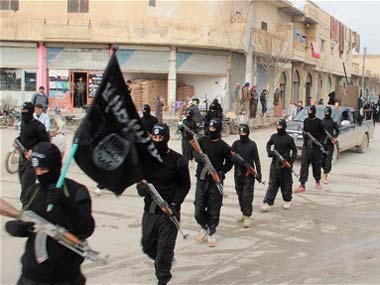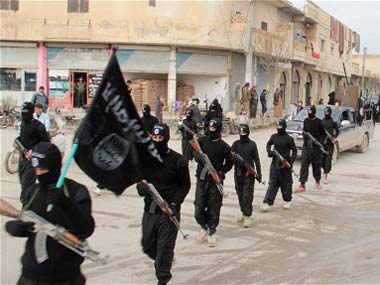The police in Pakistan’s port city of Karachi said Monday it was hunting a network of women from well-off families acting as fundraisers for the Islamic State group, highlighting its growing appeal among the country’s middle classes. Raja Umar Khattab, chief of the Counter Terrorism Department of Sindh province, said the hunt was launched after police arrested the suspected financier of a gun attack on a bus that left 44 people dead in May. [caption id=“attachment_2512812” align=“alignleft” width=“380”]  Islamic State fighters. Representational image only. Reuters[/caption] The attack on the bus, which was carrying members of the city’s Shiite Ismaili minority, was the first inside Pakistan officially claimed by Islamic State, which has proclaimed a “caliphate” over territory it has seized in Iraq and Syria and is seeking to expand its global reach. Khattab said the suspect, whom he named as Adil Masood Butt and who was arrested last week, confessed to police that his wife had established a religious organisation in the city called ‘Al Zikra Academy’. The Asian Age adds that it was Khalid Yousuf Bari’s (alleged patron-in-chief of the IS network) wife who circulated videos of the terrorist outfit among women. The website also reported that police officials claim Bari’s wife founded an academy where over 20 affluent teachers brainwash young girls and collect donations for the proscribed organisations. The website also reported that the seized laptops were sent to a forensic laboratory and key documents were recovered. The counter-terrorism department (CTD) had also arrested private university’s chief executive Adil Masood Butt among four in alleged facilitation of banned outfit’s operatives in Karachi on Friday. “The academy has no organisational structure or offices,” Khattab told AFP. “A group of 20 women, all from well-off families, distributed USBs (computer memory sticks) containing Islamic State videos, and also preached in support of terror organisations. They also arranged marriages among the group’s followers,” he added. Pakistan Today reported that law enforcement agencies took into custody three women belonging to IS on Saturday and 14 more women were identified in the investigation. Laptops were recovered from the possession of these women. He said the group collected funds for terrorists in the name of Islamic charity which were later handed over to the accused. “The wife and mother-in-law of the main suspect of the carnage, Saad Aziz, were also part of the network,” he added. Aziz, a graduate of one of the country’s top business schools, was blamed by police for both the massacre and the shooting of peace activist Sabeen Mahmud in April. He was arrested in May. Khattab said efforts were being made to track and arrest the women. For over a decade Pakistan has been waging a war against homegrown Islamist fighters that has claimed the lives of tens of thousands of civilians. The fighting has been led mainly by Al-Qaeda, the Pakistani Taliban and its affiliates, though there are signs that the appeal of IS is growing among the affluent and educated classes who are motivated more by the idea of global jihad than local causes. Islamabad denies IS is a major threat, though the police chief of Sindh province, of which Karachi is the capital, told a parliamentary standing committee in October that IS was behind the bus attack and that 14 people had been arrested for alleged links to the group. Al Jazeera reports that Pakistan has been at war with various Taliban factions, however the attacks claimed by Islamic State are a recent phenomenon. The Islamic State operates in Syria and Iraq and controls major portions of the countries. In Libya, the group has established a foothold in Sirte. IS is also active in Yemen and in Nigeria, armed group Boko Haram has expressed support to the ‘caliph’ Abu Bakr al-Baghdadi. with inputs from AFP
Police in Pakistan’s port city of Karachi said Monday they were hunting a network of women from well-off families acting as fundraisers for the Islamic State group, highlighting its growing appeal among the country’s middle classes.
Advertisement
End of Article


)

)
)
)
)
)
)
)
)



